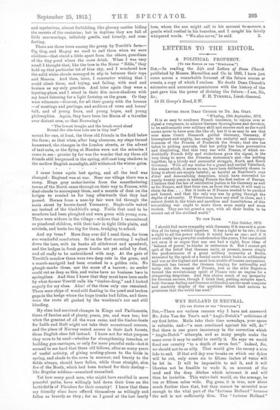LETTERS TO THE EDITOR.
A POLITICAL PROPHECY.
[TO TH1 EDITOR OF THE "SPBOTATOR."] SIR,—In reading the Life and Letters of Dean Church published by Messrs. Macmillan and Co. in 1895, I have just come across a remarkable forecast of the future course of events, a copy of which I enclose. No doubt Dean Church's extensive and accurate acquaintance with the history of the past gave him the power of divining the future.—I am, Sir,
LETTER FROM DEAN CHURCH TO DR. AEI GRAY.
" Whatley, 13th September, 1870.
It is so easy to condemn French insolence, to rejoice over ec signal a vengeance, to admire German thoroughness and devotion, to be enthusiastic over military skill and success such as the world seems never to have seen the like of ; but it is as easy to see that ever since Count Bismarck guided Germany, Germany, if triumphant and mighty, has caught the audacity and unscrupu- lousness of the Prussia of Frederick the Great ; that she has taken to picking quarrels, that her policy has been provocative and disquieting, that this very war with France, of which un- doubtedly French folly and wickedness gave time signal, is the very thing to serve the Prussian statesmen's end—the welding together, by a bloody and successful struggle, North and South Germany. With all my wishes for a grand and united Yaterland, the means which, it seems to me, have been deliberately chosen to bring it about are simply hateful; as hateful as Napoleon's coup d'etat and demoralising despotism, which have succeeded for nearly twenty years in making France the first nation of Europe, I believe that the law of retributive justice is for Germany as well as for France, and that from one, as from the other, it will wait to claim its due. . . . But it looks as if France needed to be purified and braced, and that the only way was by going through the depths of adversity. If Frenchmen have any stuff in them, and I cannot doubt it, tho trials and sacrifices and humiliations of this astonishing war ought to make them more manly and more modest. They are too grand a race, with all their faults, to be missed out of the civilised world."
To THE SAME.
"31st October, 1870.
I should feel more sympathy with Germany if it was ouly a ques- tion of its being welded together. It has a right to be one; it has a right to all the power which it would have as ono; and if it could really be a powerful confederation like yours, I for one should not envy it or argue that any one had a right, front ideas of ' balance of power,' to hinder or embarrass it. But I cannot get quit of the belief that German unity, at present, moans simply the predominance of a great military monarchy at Berlin, animated by the spirit of a feudal caste which looks on soldiership and war as the highest and most honourable of human occupations. Bismarck has turned the German longing for nationality and unity into the weapon of Prussia, jest as the elder Napoleon turned the revolutionary spirit of France into an engine for a conquering despotism. And this abates much of my sympathy for German success, though I think that, putting scruples apart, both German feeling and German soldiership are the most complete and masterly display of the qualities which lead nations to greatness that the world has seen,"


































 Previous page
Previous page